Introduction
When comparing Wix vs Squarespace for entrepreneurs, finding the right website builder is crucial for your business’s success. This guide explores key features, design options, and pricing to help you make an informed choice. Both platforms offer unique strengths tailored to different needs. Wix is known for its design flexibility and drag-and-drop functionality, while Squarespace excels in offering elegant templates and a polished aesthetic. Whether you prioritize ease of use, integrated tools, or customization options, understanding these differences will empower you to choose the best solution for your entrepreneurial goals.

Table of Contents
Overview of Wix and Squarespace
Before diving into the specifics of Wix vs Squarespace for Entrepreneurs, let’s get an overview of each platform.
Wix is a versatile website builder known for its drag-and-drop interface and extensive app market. It’s designed for users who want maximum control over their site’s design and functionality without needing coding skills.

Squarespace, on the other hand, is celebrated for its sleek and modern design templates. It emphasizes aesthetics and offers a more structured approach to building a site, making it ideal for users who appreciate high-quality design and integrated features.

Ease of Use
Wix
Wix’s drag-and-drop editor is incredibly intuitive, allowing entrepreneurs to build their websites by simply dragging elements into place. The platform offers a vast array of templates and pre-built sections that you can customize to fit your brand.
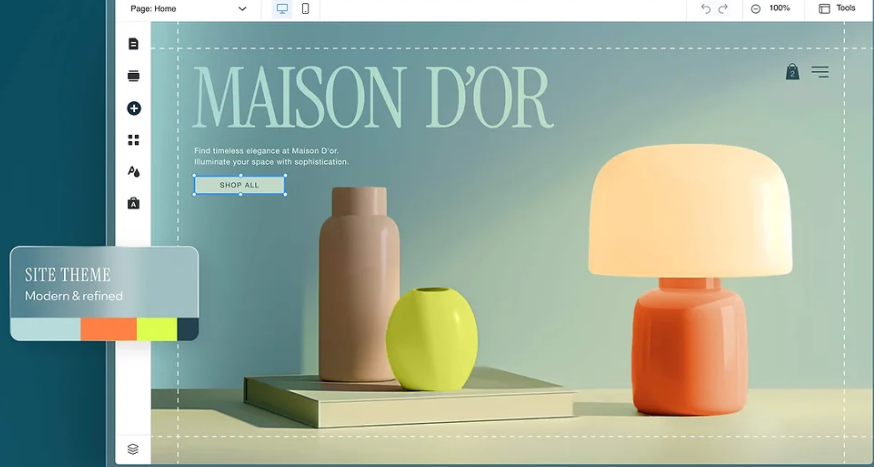
Pros:
- User-Friendly Interface: No coding knowledge required.
- Flexibility: Easy to rearrange elements and experiment with different layouts.
Cons:
- Design Limitations: While flexible, too much freedom can lead to inconsistent designs if not carefully managed.
Squarespace
Squarespace offers a more guided approach with its design-focused templates. The platform provides structured design blocks that help maintain visual consistency across your site.
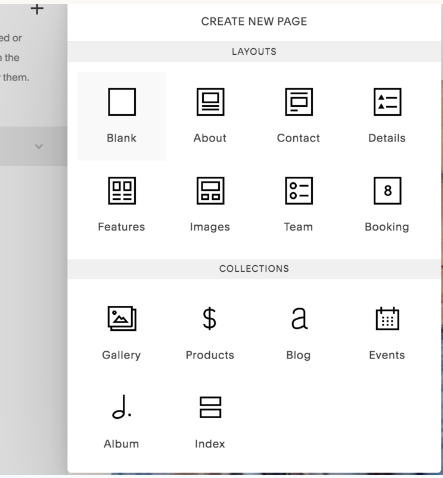
Pros:
- Elegant Templates: Designed with aesthetics in mind.
- Consistent Layouts: Maintains a professional look without much effort.
Cons:
- Less Customization Freedom: Limited flexibility compared to Wix.
Design and Customization
Wix
Wix boasts over 800 templates, each of which can be extensively customized. The platform also supports a variety of third-party apps to enhance functionality.
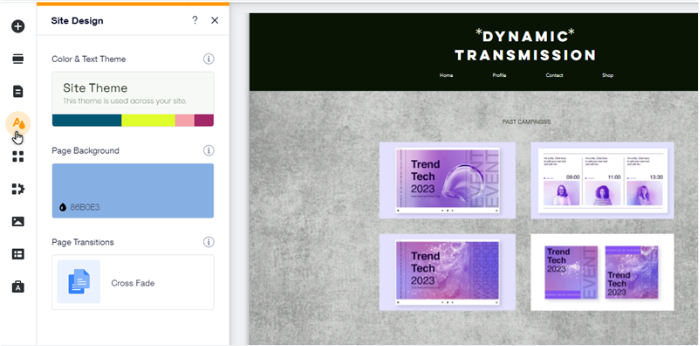
Pros:
- Template Variety: Wide range of designs to suit different industries.
- Custom Design Options: Easily tweak elements to your liking.
Cons:
- Design Complexity: The multitude of options can be overwhelming for some users.
Squarespace
Squarespace provides a selection of designer-quality templates that are highly responsive and visually appealing. These templates are crafted to ensure a professional look with minimal effort.

Pros:
- High-Quality Design: Templates are well-designed and visually consistent.
- Built-In Features: Many design features are integrated, reducing the need for third-party apps.
Cons:
- Limited Customization: Less room for design experimentation compared to Wix.
Features and Functionality
Wix
Wix offers a rich set of features, including an extensive app marketplace where you can find tools for e-commerce, marketing, and more.

Pros:
- App Market: Access to numerous apps to extend functionality.
- Built-In Tools: Features like booking systems, chatbots, and more.
Cons:
- Potential Overload: Too many options can be overwhelming.
Squarespace
Squarespace integrates many features directly into its platform, such as blogging tools, e-commerce functionality, and analytics.

Pros:
- All-in-One Platform: Many features are built-in, reducing the need for third-party integrations.
- E-Commerce: Strong tools for managing online stores.
Cons:
- Less Flexibility: Limited to the features Squarespace offers without relying on external apps.
Pricing and Value for Money
Wix
Wix offers a free plan with ads and limited functionality, and several paid plans that range from basic to premium options. The pricing structure is designed to accommodate different needs, from personal blogs to business sites.
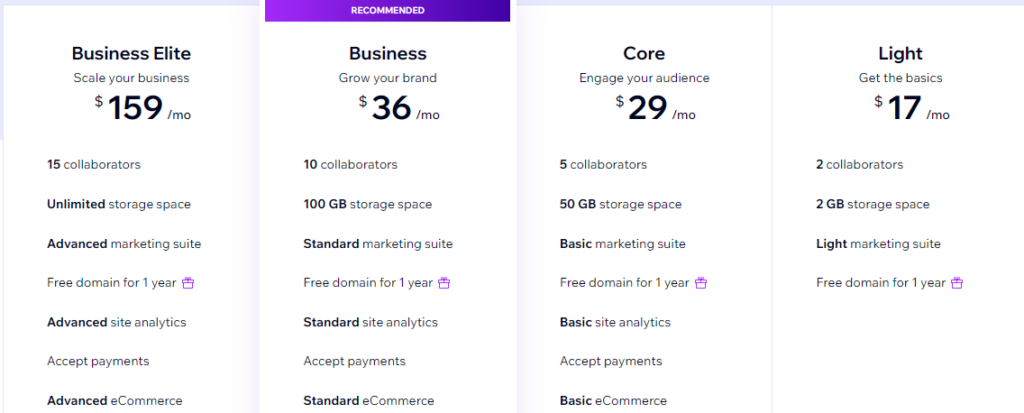
Pros:
- Flexible Pricing: Various plans to fit different budgets and needs.
- Free Plan: A good option for those just getting started.
Cons:
- Ads on Free Plan: The free plan includes Wix-branded ads.
Squarespace
Squarespace doesn’t offer a free plan, but its pricing is straightforward with a few tiered options. Each plan includes hosting and a domain.
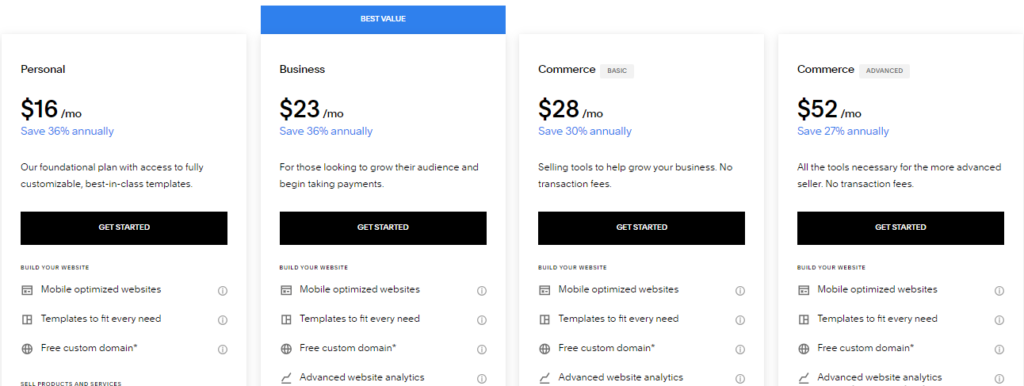
Pros:
- Comprehensive Plans: Pricing includes everything needed to run a site.
- No Ads: All paid plans come ad-free.
Cons:
- Higher Starting Cost: Generally more expensive than Wix’s entry-level plans.
SEO Capabilities
Wix
Wix provides a range of SEO tools, including an easy-to-use SEO Wizard that helps optimize your site’s visibility on search engines.

Pros:
- SEO Wizard: Step-by-step guide to improving SEO.
- Customizable Meta Tags: Control over meta titles and descriptions.
Cons:
- SEO Performance: Historically, Wix’s SEO performance has been questioned, though improvements have been made.
Squarespace
Squarespace offers strong SEO capabilities, including automatic sitemaps and clean URL structures. Its templates are designed to be SEO-friendly.
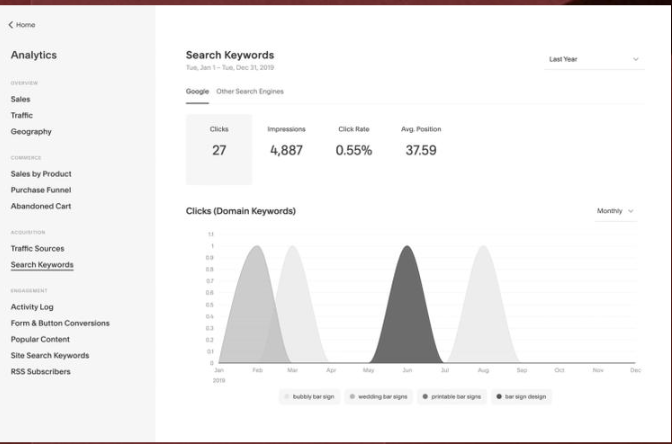
Pros:
- Built-In SEO Features: Automatic sitemaps and clean URLs.
- Good Performance: Generally performs well in search engine rankings.
Cons:
- Less Guidance: Fewer built-in SEO tools compared to Wix.
Customer Support and Resources
Wix
Wix offers a comprehensive help center, live chat support, and phone support for higher-tier plans. There are also numerous tutorials and community forums.

Pros:
- 24/7 Support: Available through various channels.
- Extensive Resources: Tutorials, forums, and guides.
Cons:
- Support Quality: Experience may vary based on the plan.
Squarespace
Squarespace provides 24/7 email support and live chat during business hours. It also has a robust knowledge base and community forums.

Pros:
- Reliable Support: High-quality email and chat support.
- Comprehensive Guides: Well-documented help resources.
Cons:
- Limited Live Chat: Not available 24/7.
Pros and Cons
Wix
Pros:
- Extensive customization options.
- Flexible pricing plans.
- Robust app marketplace.
Cons:
- Design freedom can be overwhelming.
- Free plan includes ads.
Squarespace
Pros:
- Elegant and professional templates.
- Integrated features and tools.
- No ads on paid plans.
Cons:
- Less design flexibility.
- Higher starting cost.
Conclusion
Choosing between Wix vs Squarespace for entrepreneurs ultimately hinges on your specific needs as an entrepreneur. Wix offers unparalleled design flexibility and a broad range of features, making it ideal if you seek customization and a variety of tools. Squarespace, with its elegant, professionally-designed templates and integrated features, is perfect for those who prioritize aesthetics and a streamlined experience. Evaluate your business requirements, budget, and design preferences to select the platform that best aligns with your goals. Both platforms provide powerful tools, so your choice will depend on which features and functionalities are most critical for your success.





